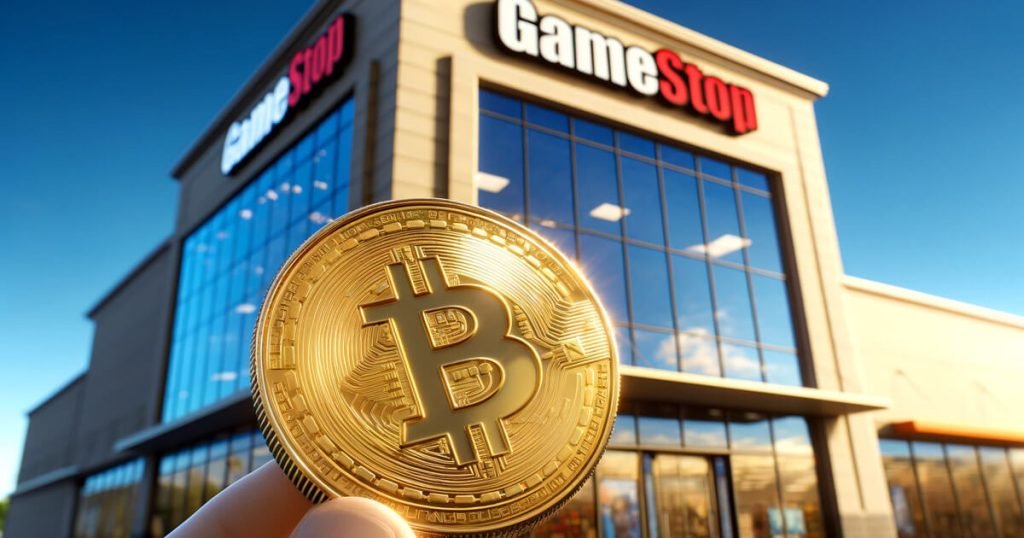GameStop’s Private Offering: A Strategic Move into Bitcoin
GameStop Corp., the renowned video game retailer, has recently made headlines with its announcement of a private offering of $1.3 billion in convertible senior notes. This significant financial maneuver aims to fund general corporate purposes, but notably includes provisions for purchasing Bitcoin (BTC) for its treasury. This announcement, made on March 26, closely follows GameStop’s strategic pivot unveiled on March 25, which emphasizes a new treasury strategy incorporating digital assets, particularly Bitcoin. While the specific amount of Bitcoin GameStop plans to acquire remains undisclosed, the move to integrate Bitcoin into its balance sheet suggests a forward-thinking approach in the evolving digital economy.
By enabling the allocation of proceeds from this offering towards Bitcoin, GameStop is signaling a diversification of its financial strategy, especially relevant given its robust cash reserves exceeding $4.5 billion. Historically, the acquisition of Bitcoin has gained traction primarily within technology and fintech sectors, yet GameStop’s foray into this asset class indicates a broader acceptance and strategic recognition of digital assets in corporate treasury management. This shift aligns with a growing trend where corporations are proactive in integrating Bitcoin into their financial frameworks as part of a long-term investment strategy.
Understanding the Convertible Notes Offering
The convertible senior notes that GameStop plans to offer are zero-coupon instruments with a maturity date set for April 1, 2030. These notes will be issued through a private placement, targeting qualified institutional buyers under Rule 144A of the Securities Act of 1933. Notably, these convertible notes are unsecured obligations of GameStop, meaning they do not bear regular interest and will not accrue in principal value. Upon conversion, the company retains the discretion to settle its obligations either in cash, Class A common stock, or a combination of both, allowing for a flexibility that may appeal to investors.
Additionally, the terms surrounding the notes—such as the conversion rate, redemption rights, and potential repurchase features—will be determined at the time of pricing, which will depend on the US composite volume-weighted average price (VWAP) of GameStop’s Class A shares on the pricing date. This financial strategy, particularly the issuance of debt to fund Bitcoin acquisitions, mirrors a widely-adopted trend where notable companies leverage similar financial instruments to bolster their cryptocurrency holdings. Such methods have notably supported firms in amassing considerable amounts of Bitcoin over the years.
GameStop’s Diversification Strategy
In light of the expanding cryptocurrency market, GameStop’s decision to use proceeds from the private offering to enhance its Bitcoin treasury reflects a targeted diversification strategy. The gaming and tech company is not only positioning itself within the traditional retail sector but is also keenly aware of the digital asset revolution shaping financial landscapes across industries. This strategic decision comes amid a period where firms are seeking ways to mitigate risks and enhance their asset portfolios, especially in light of economic uncertainties.
GameStop’s current strategy echoes broader industry practices where companies have acquired Bitcoin as a hedge against inflation and currency depreciation. The cryptocurrency market presents a compelling investment opportunity for those looking to diversify their operational assets, supporting liquidity and potential growth. As they navigate through the challenges of the retail environment, GameStop’s involvement with digital assets like Bitcoin reveals an innovative approach to corporate finance, aimed at adapting to modern economic conditions.
A Broader Trend in Corporate Finance
GameStop is not alone in its pursuit of Bitcoin. The trend of corporations investing in Bitcoin as part of their treasury reserves is becoming more prevalent, particularly among technology-driven organizations. Over the past few years, numerous prominent companies have made headlines for their substantial investments in Bitcoin, often leveraging raised funds through various financial instruments to do so. By adopting a similar strategy, GameStop is aligning itself with a growing roster of firms that recognize the potential value of Bitcoin as a long-term asset.
This trend reflects a paradigm shift in corporate finance and investment strategies focusing on long-term growth and sustainability rather than short-term returns. The interest in Bitcoin is not merely speculative; rather, it stems from an understanding of the cryptocurrency’s fundamental utility and its position within the modern financial ecosystem. GameStop’s planned acquisition of Bitcoin can be viewed as part of a broader effort to secure a foothold in this rapidly evolving market, signaling confidence and commitment to more agile financial management practices.
Market Reactions and Future Implications
As GameStop proceeds with its private offering, market reactions could be influenced by the interplay between investor sentiment towards Bitcoin and the company’s overall market performance. The zero-coupon convertible notes offering is poised to attract interest from institutional buyers, which may positively impact GameStop’s stock valuation. The option for initial purchasers to acquire an additional $200 million in notes emphasizes the company’s proactive approach to maximizing its fundraising efforts, potentially raising the total offering to $1.5 billion if fully subscribed.
Moreover, as GameStop’s foray into Bitcoin unfolds, it may open up new avenues for investment and partnerships within the digital asset space. Future announcements regarding the specifics of the Bitcoin acquisition or the execution of the convertible notes offering could further influence market dynamics. This potential volatility underscores the need for stakeholders to remain informed and alert to developments surrounding GameStop’s evolving strategy.
Conclusion: GameStop’s Blockchain-centric Future
In conclusion, GameStop’s planned private offering and its newfound strategy to integrate Bitcoin into its treasury marks a significant shift in the company’s financial approach. By embracing digital assets, GameStop not only positions itself within a burgeoning market but also demonstrates a commitment to innovative financial practices aimed at fostering growth and resilience in an ever-changing economic environment. The outlook for GameStop’s venture into Bitcoin, paired with its active fundraising efforts, could serve as a model for other corporations looking to explore the benefits of digital assets as part of their treasury management. As the landscape of corporate finance continues to evolve, GameStop’s actions may very well set the stage for what the future holds in the intersection of retail and digital currency.


